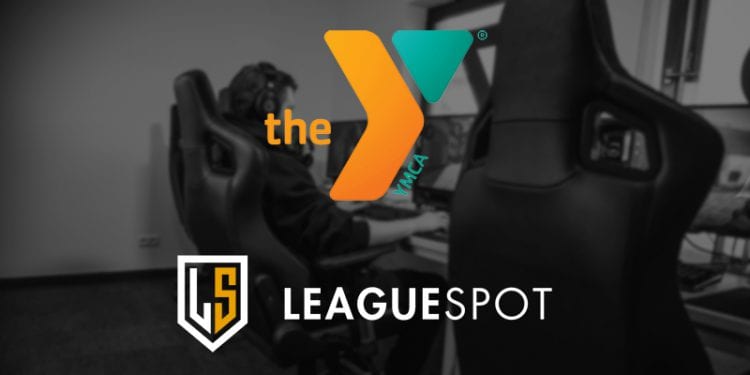
esportsobserver.com • Press Release – updated: Mar 4, 2021
The YMCA will announce later today that it is working with Chicago-based tournament platform operator LeagueSpot to build out a national esports pilot program within the storied national community organization‘s 2,300 centers across the United States that want to participate. LeagueSpot signed a partnership to begin work on this project with the YMCA in December of 2020.
The YMCA National Esports Pilot program will officially kick off on April 5, with leagues
designed for middle and high school-aged players. While the program will initially be geared towards middle and high school teens, the long-term plan is to create offerings for younger children and college-age participants at a later date, according to what the YMCA’s Chair of Esports Chris Tointon told The Esports Observer.
Tointon, who is also the CEO of YMCA of Greater Omaha, a board member of Y-USA, and part of the Y-USA innovation committee, explained that the organization has been talking about an esports program for several years, with some associations dabbling in one-off esports tournaments and events from time to time. Seeing the positive effect that competitive gaming has had in his own life (his teenage son is part of a high school esports team) and through a lot of research on the topic, Tointon began talking to friends about how the YMCA could implement its own integrated program.
“I was talking to a friend of mine who also happens to be an investor with a parent company of these two [referring to LeagueSpot CEO Andrew Barnett and COO JD Healy], and he suggested we connect,” Tointon said. “And so we spent a lot of time talking about what the YMCA expected out of esports, and we ended up putting together a group of individuals from all over the country who were interested in this at the Y.”
LeagueSpot was by no means a shoo-in for this partnership; Y-USA held a rigorous RFP process to select a technology partner for its esports program, and the company had to prove that it knew what it was talking about, had the technical chops to handle the task, and understood what the YMCA was trying to accomplish. Ultimately they beat out everyone else.
Both Barnett and Healy see this partnership as a gamechanger for esports, and as a personal milestone for their company.
“We care deeply about creating great player experiences and organizational successes, so to be able to provide a solution to a groundbreaking program of this magnitude is of immense excitement to us,” Barnett said.
LeagueSpot is no stranger to building out programs for large institutional partners; it operates a number of league offerings for high schools and colleges across the country, most notably for the State University of New York (SUNY), but YMCA’s program is one of the largest ecosystems it has worked on to-date.
Safety and Creating Good Citizens
Tointon says that the esports program will support two models for Ys to use across the country: an in-person model with equipment at all the Ys in the system, and support through LeagueSpot’s platform for a virtual or home edition that allows kids to connect remotely. Some Y locations that have support from local colleges and universities will use their facilities– Tointon mentioned Oklahoma City, Austin, and Chicago as some of the places where that kind of cooperation exists. LeagueSpot will oversee the technical operations.
Besides managing the technical ops, Barnett says that LeagueSpot has created guidelines to help Ys in the country get up and running quickly by helping organizers understand the most important aspects of the setup. “We have been able to actually build a grassroots local program at each of these Ys, but it’s standardized. And so part of this is we’re, co-branding a training program that teaches folks who might not know a lot about esports how to run events, the strategies and the tactics around running them, why you do things a certain way, and the games that could be involved, et cetera.”
One of the most important aspects of hosting events for the Y is creating a safe environment that kids can be comfortable in and parents can continue to feel confident about. The Y has for centuries been a safe place for parents to send their children, particularly after school because a mom or a dad is still at work and there’s no one at home. And while Tointon thinks esports is a great thing for children, his research revealed that there aren’t many programs that have the level of safety and management that they want to provide.
“The more homework I did on this, the more I felt that esports is great for young adults, but there are very few ecosystems set up so that kids can be safe, have a monitoring system in place to deal with bullying, address early development, deal with maturity issues, and manage the games that they play and how they play them.”
The advantage the Y has, according to Tointon, is that it has a record of safety and has earned the trust of parents in the United States, having spent nearly two centuries keeping kids safe.
“The YMCA has a safety record and a child abuse prevention platform so it’s going to be safer than any other offering. We know every kid that’s coming into the system, we have a CRM process that takes them in and checks their backgrounds. It will check their ages. It’ll understand where they’re coming from. And it’s not just a gamer tag; It’s a real person that we as YMCA people know across the country, and we have systems built and in place for that.”
But also equality is important to the Y in providing more than just gaming, as the goal of the organization is about helping children to grow through teamwork, good nutrition, exercise, and more. The Y has worked with a partner (to be announced) to develop a curriculum specifically for its esports program.
“We have an incredible eight-week system that’s not only teaching the games and the skills that it takes to participate in esports, but also how to be a good human, a good friend, a good teammate, and how to be good in your community.”
In addition to this, the system tied to its esports program will have a point system where players can earn credit for doing positive activities like volunteering in the community, doing a workout class at the Y, getting good grades in school, and more.
One of the things Tointon emphasized about the program is that it will be all-inclusive, giving access to everyone that wants to participate no matter their race, creed, color, sexual orientation, gender, or economic circumstances.
“I think the other thing that we’re really focused on is that equity is super important to the YMCA. So we’re focused on this not being a white male upper middle class dominated sport. We’re focused on ways that we can get into urban environments, focused on including girls, get people of color involved in the sport, and that we can make sure that it’s accessible financially for all people.”
Hearts and Minds
Finally, the most important side effect of the YMCA embracing esports in the U.S. could be that it will greatly help educate parents on what competitive gaming is all about and why it is not a negative or a waste of time.
“We’re going to have a lot of work on educating the community and I think the YMCA comes in at a good place because parents trust us,” said Tointon. “They understand that we’re not putting programs out, just to make money. We’re putting programs out because we want to help youth. And so I think we’ll get a listening ear a lot better than other places that might do this or a for-profit entity that might do this.”
“If the Y says that they’re supporting this, you know that they’ve considered all the safeguards that have to be involved in it, and that it actually adds to the value of your child’s development. That just gives the parents a sigh of relief that they can put their kid into this type of program,“ added Healy.
